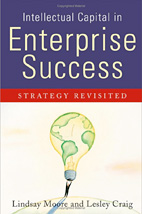A panoramic view of Radcliffe Camera and All Souls College in Radcliffe Square, Oxford, UK. Founded in the 11th century, Oxford University is the second oldest university in the English-speaking world.
Two Approaches to Reinventing Marketing
As capitalism with its “selling,” and consumerism with its “buying,” approach saturation in the Western world, marketing, as a discipline, finds itself facing an increasingly difficult proposition – “how can it sell more to consumers who have everything and refuse to be sold to?
Strategic Readiness
The competitive advantages found in modern corporations, non-profit organizations, and even governmental agencies are increasingly determined by the strategic readiness of their intangible assets. Typically, an organization’s physical assets, such as machinery, finished goods inventory, or cash are immediately deployable in most situations. However, intangible assets present new challenges in terms of how responsively they can be deployed for business purposes.
The Possibilities for Patenting Supplement Formulations (PDF)
Intellectual property, and in particular a patent, is critical to protecting product formulations. Patents are the ‘holy grail’ of such formulations, and if a company owns a strong patent it has a limited monopoly in the marketplace that allows it to prevent competitors from copying or otherwise trading on its recipe or formulation for the term of that patent.
What Is Intellectual Capital?
An explanation of the seven areas of Intellectual Capital: the brand, intellectual property and goodwill, active intelligence, corporate culture, people, experience and history, the work product.
Non-Financial Performance Measurements
We are all well-acquainted with the traditional measures of enterprise performance. But today, under the influence of globalization, environmental crises, and widespread ethical breakdown there is pressure to identify and report new, non-traditional, and “non-financial” measures of performance to get at newly recognized dimensions of enterprise value, success, and significance. These new demands emerge from a belief that social, environmental, ethical, and geopolitical factors materially impact the ability of a company or enterprise to perform favorably.
A Theme Park for Dracula?
A Theme Park for Dracula? Entertainment Branding. During the early 1990s, with the success of Walt Disney World in Florida, it seemed that theme parks were the brand building tool of choice for any Brand which could offer entertainment and rich media. Driven by the need to build a post-communist economy, Romania has moderated its previous rejection of Dracula as a vampire and shifted its focus to leveraging the Transylvanian myth for economic gain.



 As the knowledge-based economy expands, the companies and individuals that possess intangible intellectual assets, such as intellectual property, will need specialized expertise, strategic thinking, legal experience, and the wisdom necessary to manage intellectual assets.
As the knowledge-based economy expands, the companies and individuals that possess intangible intellectual assets, such as intellectual property, will need specialized expertise, strategic thinking, legal experience, and the wisdom necessary to manage intellectual assets.